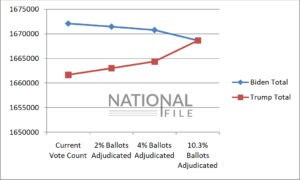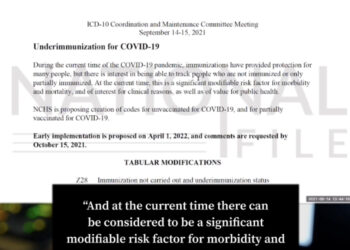Last Updated on May 6, 2021
After the Arizona Democrats and the Arizona Senate reached a settlement that the firm conducting the Maricopa County audit would not verify signatures on mail-in ballots without a prior agreement from the Arizona Democratic Party, Republican Party Chair Kelli Ward said she “certainly” hopes Cyber Ninjas will obtain such an agreement, citing a previous examination of a small sample of ballots that saw between 6% and 11% of signatures were “unlikely to be a match.”
Yesterday, National File reported that the Arizona Democratic Party reached a settlement with the Arizona Senate and the firm conducting the Maricopa County audit, Cyber Ninjas, that requires Cyber Ninjas to obtain agreement from the Democrats to begin examining whether signatures on mail-in ballot envelopes match the voter’s on-file signature. In a video update posted yesterday night, Ward revealed that this is not currently being done, and was not stopped, as the Democrats suggested in a press release, but said that she hopes the process of verifying signatures will be part of the audit.
According to Ward, the settlement states that “Cyber Ninjas will give a 48 hour notice if they want to begin signature verification on absentee ballots. That’s not currently being done,” added Ward. “I certainly hope it will be based on what we saw right after the election, when the court allowed our team to examine 100 signatures, and 6-11% of that small, small sample was thought to be unlikely to be a match by handwriting experts.”
There's a lot of fake news out there on America's Audit. Watch Arizona Chairwoman @kelliwardaz who's led the @AZGOP fight for a forensic audit from day one, and get the Straight Talk you want to hear. #AmericasAudit #FinishTheAudit pic.twitter.com/lTTgv8AXP3
— Republican Party of Arizona (@AZGOP) May 6, 2021
Ward appears to be referring to one set of 200 ballots that a court allowed to be reviewed last December. While the 100 mail-in ballots suggested a discrepancy in signatures on file from voters and those on the envelopes containing votes cast by mail, the other 100 ballots suggested issues in duplication of damaged ballots that could have possibly swung the election.
The small sample of 100 ballots contained two votes that were adjudicated incorrectly. One vote was meant to be cast for President Donald Trump, and a poll worker instead assigned it to Joe Biden, while another ballot was meant to be cast for President Trump and was instead eliminated entirely. National File reported:
National File has undergone an exclusive and extensive mathematical analysis to discover what the total vote count, and therefore Biden’s Arizona lead, may look like if the findings of this sample size can be extrapolated to state level. It is unknown how many ballots required duplication, as the statewide canvass did not specify this. National File is therefore using the pre-election estimate of Maricopa County, which suggested they may see around a 2-4% reduplication rate.
Before entering the analysis, it is important to note that we will be using the total votes cast in the state for all candidates as our starting number, (3,397,388), rather than the total votes cast for Trump and Biden together, as we are assuming that the 100 vote sample was a fair sample, and was therefore likely to include votes for other candidates. The initial vote sample returned a rate of 2% of the votes in the sample that should have been cast for Trump that were not.
There are also two types of vote change happening here. Biden currently leads Trump by 10,457 votes. The vote not counted for President Trump would remove one vote from him, and the vote that was initially given to Biden, but returned from Trump, would reduce the total vote difference by two, as it removes one away from Biden, and giving one more to Trump. We will therefore be multiplying the total error votes in our calculation by 1.5 to correct for this. This is equivalent to a 3% change.
This latest development comes as the Biden administration’s Department of Justice has involved itself in the state level audit, sending a letter expressing concerns generally held by left wing politicians and activist groups.






















